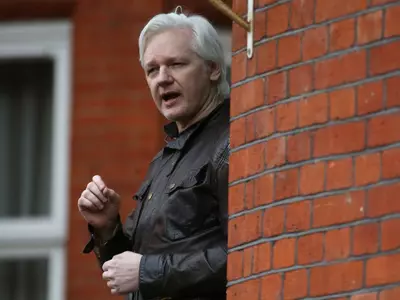Julian Assange, the founder of WikiLeaks, has admitted guilt to conspiracy charges related to the acquisition and dissemination of national defense information, marking the conclusion of a protracted legal saga and paving the way for his return to Australia as a free man for the first time since 2012.
The plea was entered at a court in the Northern Mariana Islands, a U.S. commonwealth situated north of Guam, on Wednesday morning local time, as reported by The Associated Press. Following the hearing, Assange is anticipated to depart for Australia, his country of birth and citizenship, according to statements from WikiLeaks.
The concession by Assange, known for releasing a trove of classified documents that embarrassed multiple governments and which the U.S. alleges jeopardized national security and aided adversaries, forms part of a plea agreement resulting in a 62-month sentence — time he has already served.
“In court, I acknowledge the contradiction between the First Amendment and the Espionage Act, but I understand the difficulty in prevailing under these circumstances,” Assange expressed during proceedings, as reported by Thomas Mangloña II of NBC affiliate KUAM of Guam, present at the hearing.
Assange refrained from responding to queries from journalists as he entered and exited the court.
Barry Pollack, Assange’s attorney in the U.S., described the prosecution of his client under the Espionage Act as unprecedented. “Mr. Assange disclosed truthful, significant, and newsworthy information, including revelations of U.S. war crimes,” Pollack remarked outside the court on Saipan, asserting that Assange should never have faced charges.
Assange and WikiLeaks gained notoriety for disseminating classified U.S. military documents and videos from the Iraq and Afghanistan wars, including footage depicting a deadly Apache helicopter attack in Baghdad.
The website also published approximately 250,000 State Department diplomatic cables and, in 2016, released stolen emails from the Democratic National Committee and Hillary Clinton aide John Podesta ahead of the presidential election.
Assange’s arrest at the Ecuadorian Embassy in London in 2019, where he had sought asylum amid Swedish sexual assault allegations, marked a turning point. Though the Swedish case was dropped due to the statute of limitations, Assange faced charges for bail violation. Concurrently, U.S. federal prosecutors unveiled a hacking charge and sought his extradition.
During his legal battle, Assange spent five years in high-security confinement at Belmarsh Prison in east London.
The U.S. Department of Justice accused Assange of conspiring with former military intelligence analyst Chelsea Manning from 2009 onwards to obtain confidential documents, subsequently disseminated through WikiLeaks. The leaks encompassed reports on the Iraq and Afghanistan wars, State Department cables, and assessments of Guantanamo Bay detainees.
In a 2019 superseding indictment, the Department of Justice labeled Assange’s actions as “one of the largest compromises of classified information in U.S. history,” alleging that his disclosures endangered individuals who had assisted U.S. operations.
“The decision to reveal the identities of human sources, shared illegally by Manning, posed a serious and immediate threat to life,” the Justice Department underscored.
Manning, initially sentenced to 35 years imprisonment, had her sentence commuted by then-President Barack Obama in 2017. Her subsequent refusal to cooperate with a grand jury in 2019 led to her being held in contempt for almost a year.
Following his plea, Assange is not expected to serve additional time in custody. His wife and attorney, Stella, intends to seek a full pardon for him based on journalistic principles.
“The guilty plea under the Espionage Act concerning the acquisition and dissemination of National Defense information raises serious concerns for journalists and national security reporters,” Stella remarked to Reuters, also indicating plans to raise funds to reimburse the Australian government for Assange’s return.
Australian Prime Minister Anthony Albanese welcomed the development, asserting Assange’s right to return home, emphasizing that the prolonged legal proceedings served no constructive purpose.
“Regardless of opinions on Mr. Assange’s actions, the case’s duration has been excessive,” Albanese stated before Parliament. “There is no benefit to continuing his detention, and we advocate for his return to Australia.”
WikiLeaks, ahead of the court proceedings, criticized the necessity of the plea deal, asserting Assange’s presence on Saipan to formalize the agreement before heading to Canberra, Australia.
As per the terms of the 62-month sentence, which includes time served, Assange is prohibited from reentering the U.S. without permission, according to the Justice Department’s stipulation.


